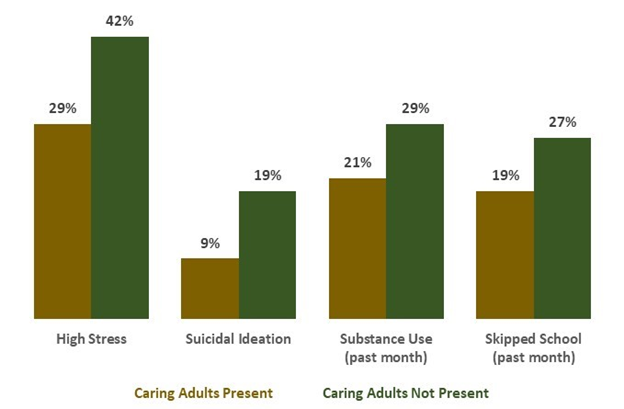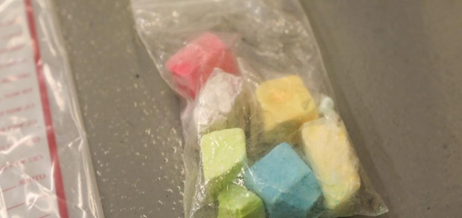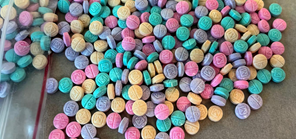Substance Abuse and Prevention Program
Substance Abuse Prevention Specialist (SAPS) Introduction
Each school pyramid has a Substance Abuse Prevention Specialist (SAPS) assigned to provide substance abuse prevention, education, and intervention services. Substance Abuse Prevention Specialists are part of the FCPS Office of Student Safety and Wellness.
Key roles of a Substance Abuse Prevention Specialist:
- Alcohol, Tobacco, and Other Drug education for students, parents, and the Fairfax County Community
- Intervention services upon violation of the Student Rights and Responsibilities handbook or suspected substance use involvement
- Assessing a student’s level of substance use and, if appropriate, making referrals to the Fairfax Community Service Board for additional services or other community resources as appropriate
- Group and individual prevention services for students, staff, parents, and the Fairfax County community
- Most importantly, building positive relationships with students to provide support and encouragement
Resources:
- Free Virtual Parent Support Group
- Free Online Narcan Training for Opioid Overdoses
- Free Lock Boxes for Medications & Firearms
- Spiritual Support by Phone for Adults
- Spanish Podcast: Tips on How Parents Play an Important Role in Substance Abuse Prevention
- Juvenile Court Parent Support Group
For general questions about the FCPS Substance Abuse Prevention Program, please contact the Office of Student Safety & Wellness at: (571) 423-4270.
For further Information & support:
Michael McNulty
Substance Abuse Prevention Specialist
Red Ribbon Week & Counterfeit Pills
Not only is Halloween approaching, but October is Substance Abuse Prevention Month, and Red Ribbon Week is October 23- October 31. Red Ribbon Week, sponsored by the DEA, is when young people pledge to live drug-free lives and show their commitment by wearing a red ribbon. Some of our very own elementary schools will be wearing red ribbons, to show their respect for Enrique “Kiki” Camarena, a Mexican American DEA agent, who was murdered while working to expose drug traffickers.
Parents, you can help prevent substance use more than you know. The Fairfax County Youth Survey shows that students who say there are caring adults present in their lives are significantly less likely to engage in risky behaviors or report poor mental health conditions. 
Now that Halloween is approaching, it’s time to remind your students that drugs are often made to entice young people to use (e.g. marijuana edibles, colorful packaging, rainbow fentanyl). The younger a person begins to use drugs, the more difficult it is for them to abstain later in life (NIH).
Sources & Resources:
- DEA
- DEA Fentanyl Gallery
- Fairfax CSB Opioid Info
- REVIVE Training for Opioid Overdoses
- FCPS Substance Abuse Prevention Program
- Fairfax County Youth Survey
For general questions about the FCPS Substance Abuse Prevention Program, please contact the Office of Student Safety & Wellness at: (571) 423-4270 and be sure to follow us on Twitter at @FCPSSAPS.
For further Information & support:
Michael McNulty
Substance Abuse Prevention Specialist
What You Can Do to Prevent Substance Abuse
What You Can Do to Prevent Substance Abuse
It’s true, youth are more inclined to listen to their peers than their parents. This is part of the way the brain develops. When a baby is born, their brain’s sole responsibility is keeping them alive, then as they grow into adolescence, finding their tribe becomes important. Think of your top three happiest memories. What were you doing? How did you feel? Who was there? Each of these memories was likely a shared experience. You were laughing and smiling with loved ones, maybe food was even involved. Now think of your three worst memories. What was going on? How did you feel? Who was there? In each of these memories, you likely were alone or felt alone.
Substance use becomes a problem for some because they either are alone or felt alone. Connection has been shown to be important in our everyday lives, again think of your happiest memories. Fairfax County’s “Three to Succeed” describes protective factors that youth need to achieve their higher selves. If a child has at least three of these protective factors, they are more likely to succeed in life: having high personal integrity, having community adults to talk to, performing community service, participating in extracurricular activities, having teachers recognize good work, and having parents available for help. What you notice is five of the six protective factors involve connection with someone else, the first protective factor describes connection with oneself.
Here’s Some Helpful Resources:
For general questions about the FCPS Substance Abuse Prevention Program, please contact the Office of Student Safety & Wellness at: (571) 423-4270 and be sure to follow us on Twitter at @FCPSSAPS.
For further Information & support:
Michael McNulty
Substance Abuse Prevention Specialist
International Overdose Day
International Overdose Day
Did you know that we are still in an opioid epidemic? Opioids are a class of drugs that include the illegal drug heroin, synthetic opioids such as fentanyl, and pain relievers available legally by prescription, such as oxycodone (OxyContin®), hydrocodone (Vicodin®), codeine, morphine, and many others (NIH).
The opioid epidemic began with an increase of prescribing these highly addictive medications in the early 1990s.The increase of these medications in society created the issues of overuse and misuse that contributed to the ongoing opioid crisis. In 2010, there was a similar influx of continual problematic opioid use. As a result of the rising opioid overdoses in the community, Fairfax County developed the Opioid Task Force in 2017. Fairfax County created the Substance Abuse Prevention Program in response to the need for prevention education in the schools in 2018. This effort placed Substance Abuse Prevention Specialists in each pyramid.
Opioid abuse is now the leading cause of unnatural death in Fairfax County according to the Office of the Chief Medical Examiner. It is in our community and often goes unnoticed. In 2017, over 100 deaths were attributed to opioid overdose in Fairfax County. Over 1,200 opioid overdose deaths were reported in the State of Virginia. The 2021 data from the first and second quarters indicate there has been a slight decline since the COVID-19 pandemic. How does this affect our families?
Prescriptions in the home are one of the primary ways children gain access to opioids (i.e. OxyContin), and other addictive and harmful medications, such as benzodiazepines (i.e. Xanax). You can make a beneficial impact on this issue by not saving medication for future use, properly disposing of unused medication, and not giving your prescriptions to children. You can access drug disposal boxes at designated locations throughout the county. For general questions about the FCPS Substance Abuse Prevention Program, please contact the Office of Student Safety & Wellness at: (571) 423-4270.
Resources:
- Safe Disposal Medication Sites: https://www.fairfaxcounty.gov/health/drug-disposal.
- Truth Initiative Student Opioid Story: https://youtu.be/gODuvhM0BsQ
- Narcan Training (English & Spanish): https://www.fairfaxcounty.gov/community-services-board/heroin-opioids/revive
- Fairfax County Youth Substance Use Trends: https://youtu.be/FiqPh38dtd4
- Rainbow Fentanyl: https://www.dea.gov/press-releases/2022/08/30/dea-warns-brightly-colored-fentanyl-used-target-young-americans
For further Information & support:
Michael McNulty
Substance Abuse Prevention Specialist
Alcohol & Football
Alcohol & Football

As the cooler weather comes in, the leaves begin to change, and we exchange our sandals on beaches for boots and Pumpkin Spiced Lattes, football becomes the topic of many conversations. Families gather wearing their paraphernalia, rooting for “their team”, and enjoying a nice cold beer. Adults may do this within the safety and confines of their own home, while sitting on the couch after a relaxing Sunday morning. When teens see this regularly, they may associate alcohol with football. They attend their school’s football game, it’s their night out with friends, and the close association between football and alcohol has already been established for them.
The media shows ads from various companies showcasing their ice-cold brew, with the stereotypical masculine man at a bar, appearing cool. When adults attend in-person games, tailgating isn’t an option, it’s mandatory to have the full experience. When teens meet up before attending football games, pre-gaming may be something they consider.
Alcohol.org states that people who watch games at viewing parties average 7 drinks and those who tailgated averaged 8 drinks. In a country that values football and has connected football to the consumption of alcohol, why wouldn’t teens do the same? If your student is old enough to attend football games, they’re old to have conversations about alcohol safety.
Tips
- Establish clear and consistent boundaries “I will not tolerate…”.
- Explain why adults drink and adolescents are not allowed to drink.
- Do not exaggerate.
- Set a desired outcome for the conversation: what do you want your teen to understand before you get into the heavy convo?
Resources
FCPS video on Alcohol, Tobacco, and Other Drugs https://dl.ebmcdn.net/fcps/courses/ATODParentPresentationRequired103119b/story_html5.html
For general questions about the FCPS Substance Abuse Prevention Program, please contact the Office of Student Safety & Wellness at: (571) 423-4270.
For further Information & support:
Michael McNulty
Substance Abuse Prevention Specialist
EMAIL: @email
Rainbow Fentanyl
Rainbow Fentanyl


The DEA has issued a public warning educating the community about rainbow fentanyl. These particular pills are targeted to youth and young adults by its colorful candy-like appearance making them look harmless. Rainbow Fentanyl resembles playground chalk before it is pressed into pills and has been found in 18 states including West Virginia and New York and are sold as low as $17 (Hawaii) per pill making them affordable. In August of 2022 47,000 pills were confiscated at the Arizona border as well as 186,000 “Perc 30’s” or “Blues”, another popular synthetic opioid found in our county.
The trend, as reported by users, is to crush the pills, smoke it off of a piece of aluminum foil, with the theory that it is “safer” than snorting. When burned, it often gives off a distinct odor of burned rubber. While we have not seen Rainbow Fentynal yet, Perc 30’s or Blues are popular among adolescents and young adults in Fairfax County and the surrounding areas. Fentanyl is also found in counterfeit prescription pills, cocaine, Xanax, and other licit and illicit drugs.
The Medical Examiner from the Virginia Department of Health recently released its 1st quarter data for 2022 stating 483 people have died from fatal fentanyl overdoses in the state. For Fairfax County data and additional information on youth substance use, please see the Fairfax County Youth Substance Trends webinar linked below.
Substance Abuse Prevention Specialists (SAPS) provide Tier 1 support throughout FCPS. Each high school pyramid is assigned a SAPS who conducts brief interventions, psychoeducation, and presentations to students, staff, families, and community members. Topics of discussion include alcohol, tobacco and other drugs (ATOD) as well as current trends on substances. For general questions about the FCPS Substance Abuse Prevention Program, please contact the Office of Student Safety & Wellness at: (571) 423-4270.
Sources & Resources: For further Information & support:
DEA Rainbow Fentanyl Press Release Michael McNulty
Narcan Training (English & Spanish) Substance Abuse Prevention Specialist

